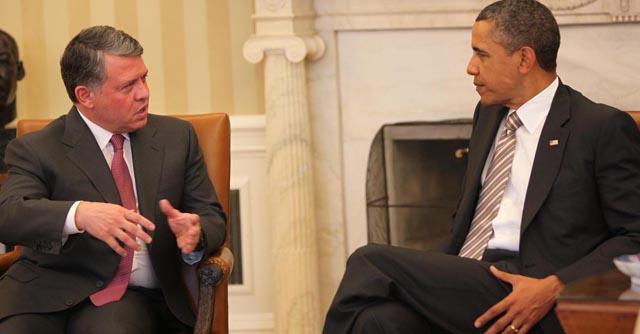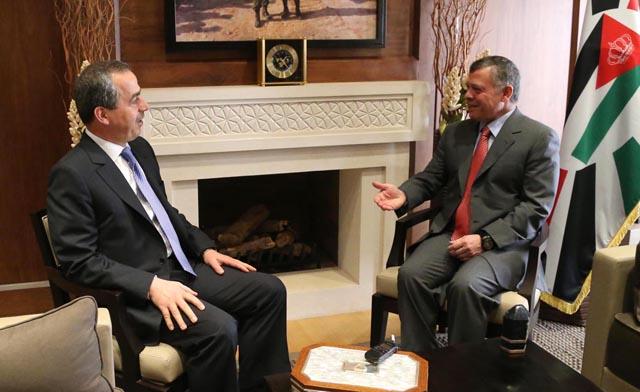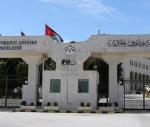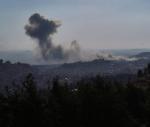You are here
Jordan seen too important, firm to be ignored in final Mideast solution
By Omar Obeidat - Feb 20,2014 - Last updated at Feb 20,2014

AMMAN – Jordan will reject any proposal to end the Palestinian-Israeli conflict that does not take into account the Kingdom’s national interests, politicians and analysts agreed.
They said His Majesty King Abdullah made this stand clear to American decision makers during his recent visit to the US, which is not likely to leave Amman out in the cold when the Palestinians and the Israelis reach a deal to resolve the region’s oldest issue.
In separate interviews with The Jordan Times on Wednesday, experts highlighted the importance of the King’s summit meeting with US President Barack Obama –– in California that lasted for two-and-a-half hours –– and administration officials in addition to Congress members, saying the officials in Washington trust the vision and “wisdom” of His Majesty regarding regional issues.
Former prime minister Samir Rifai said that finding a solution to the Palestinian-Israeli conflict that guarantees the establishment of a viable state for Palestinians on their national soil has always been a Jordanian cause.
“The timing of the visit and what the King said during the talks were very significant,” Rifai added in a phone interview.
“Jordan’s national interests have always been on top of the discussions His Majesty has held with world leaders,” Rifai said, adding that the Kingdom traditionally supports any all-win peaceful resolutions that would protect its interests and enable Palestinians to establish their independent and sovereign state.
On US Secretary of State John Kerry’s efforts to push the Mideast peace process forward, the former premier said it would be still premature to talk about Kerry plan before the envisioned framework agreement sought by Washington is drafted and publicised.
The King, Rifai said, was outright in his discussions with US officials, making it clear that Jordan supports peace efforts as he stressed the need to find a solution to all final status issues, such as refugees, borders and Jerusalem but without compromising Jordan’s interests.
The US administration respects and listens to the views of the King regarding regional issues, he said, adding that Jordan was the first country to talk about the need for a political solution to end the Syrian crisis.
“Since the start of the Syrian crisis Jordan said that a political solution was the only way to end the almost three-year conflict and the world has realised that lately,” Rifai noted.
Former Royal Court chief Jawad Anani said the relentless efforts of His Majesty to bring peace in the region are appreciated in Jordan and elsewhere in the world.
On the visit to Washington, Anani said that lobbying to protect Jordan’s interests is very important, particularly within decision-making circles in the US.
“The King enjoys the respect of the American people and administration,” Anani agreed, adding that the relation between Jordan and the Palestinians is also deep.
As long as final status issues –– particularly the fate of refugees –– remain unsolved, the domestic situation in the Kingdom will continue to be confused, he explained, indicating that political and economic reforms in Jordan are linked to the seven-decade conflict between Palestinians and Israelis.
On the Kerry plan, which has been the topic of heated public debate involving politicians, lawmakers, opinion leaders and the average man in the street over the past weeks, Anani said that the US top diplomat is still in the stage of testing the waters.
He stressed that King Abdullah is working to protect both the interests of Jordan and the Palestinians.
“It is good that Jordanian politicians are warning against any plans that would touch the country’s interests. People here are on their tiptoes, and the state of confusion is fuelled by lack of information from the US regarding the plan,” he added.
Anani indicated that Jordan might come under pressure to offer compromises, but no one can force the country to accept anything that could hurt its interests.
“Jordan is a key player to any solution,” he said.
Former minister of state for media affairs and communications Samih Maaytah said the US’ consistent support for Jordan proves that Washington holds Amman in high esteem.
“The US is Jordan’s biggest supporter in terms of financial and military aid, and this support is increasing,” Maaytah said.
The King’s visit to Washington coincided with the conclusion of Geneva II conference –– aimed at finding a political solution to the Syrian crisis –– and amid US efforts to achieve peace between Palestinians and Israelis, the former minister and veteran columnist said.
Fahed Kheitan, political analyst and columnist at Al Ghad daily, said Jordan’s stability is essential for the US’ interests in the region in the first place, adding that the Kingdom, at the same time, is keen to guarantee Palestinian refugees the right of return or compensation and the right of Jordan to be compensated for hosting millions of Palestinian refugees for decades.
Hashemite custodianship to holy places in Jerusalem is also a top priority for Jordan that should be taken into account of any peace proposal, Kheitan said.
Jordan’s views regarding peace and other regional issues are important to the US administration, which will consider the Kingdom’s interests when offering any plans for political settlement, according to the analyst.
Foreign Minister Nasser Judeh has echoed the same remarks of the politicians when he told MPs early this month that Jordan will not accept any solution to the Palestinian refugee issue without taking into consideration its national interests including those of its citizens of Palestinian origin.
Judeh said that the Kingdom retains its right “to reject, accept or express reservation” over any solution that comes at the expense of the country’s national rights.
Related Articles
The notion of “a substitute homeland for Palestinians in Jordan” is being manipulated by certain political figures to place pressure on the establishment and decision makers to gain personal benefits, analysts and politicians agreed on Monday.
The economy remains Jordan’s biggest concern due to its direct influence on the living conditions of Jordanians, especially the middle class, a senator said on Wednesday.
His Majesty King Abdullah has sent a strong foreign policy message to world and regional players ahead of the Kuwait-hosted Arab summit, politicians and analysts said Sunday.















